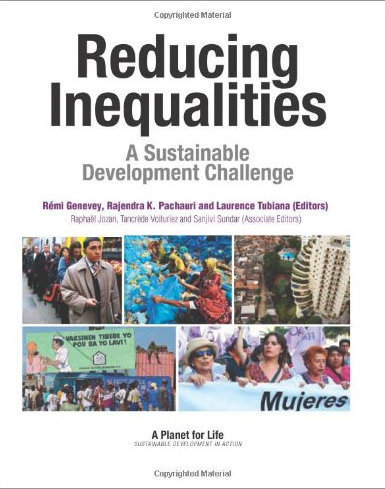In a new book entitled “Reducing Inequalities: A Sustainable Development Challenge”, presented at the EuropeAid InfoPoint on 28 May 2013, scholars and development specialists argue that bridging the gap between the rich and the poor is a factor of development, and therefore a crucial question to tackle when setting up development policies and the post Millenium Development Goals.
The authors of the book have considered the concept of inequality at two levels: inequality between countries, and inequality within countries, showing that in the shift of growth from the West to the East, the former has reduced while the latter has generally widened.
Dr Tancrède Voituriez, a Programme Director at the Institute for Sustainable Development and International Relations, and an Associate Editor of the book, said that given the data they have collected, the authors are under the “strong impression” that reducing inequalities is a good leverage to foster development.
“More equal societies tend to be more resilient, this means more likely to enjoy a sustainable development gross rate, better performance on environmental protection and to perform better on the health sector,” Dr Voituriez said.
The authors cited Brazil and Indonesia as two emerging countries where the poverty gap has reduced, thanks to the collection of data on which a pro-active poverty-reduction policy has been built, and charismatic leadership.
In Brazil, the Map of Hunger, published in 1993 by an important public think tank was a turning point as it highlighted the fact that 32 million people were living in hunger in Brazil, both in rural and urban areas. This publication also provided an analysis of the food production situation, concluding that Brazil produced an amount of calories and proteins that could feed a population 50% bigger than its own. As a result, in the face of growing civil mobilisation over the problem of poverty and hunger, the country’s politicians took action towards helping the destitute majority.
The idea of universalisation of welfare was included in the 1998 Brazilian Constitution, and the Fome Zero programme, coordinated by the Brazilian Minister of Social Development, was subsequently set up.
This programme puts into action the government's strategy to guarantee the right of access to basic food. It takes a number of forms, ranging from direct financial aid to the poorest families (with the Bolsa Familia), to diverse strategies such as creating water cisterns in Brazil's semi-arid areas, creating low-cost restaurants, educating people about healthy eating habits, distributing vitamins and iron supplements, supporting subsistence family farming and giving access to micro-credit.
A study by the UNDP Poverty Centre found that the Fome Zero Programme has contributed towards a 20% drop in inequality in Brazil since 2001, which is a substantial change in one of the most unequal countries in the world. Research promoted by the World Bank also showed a significant reduction in child labour, as a result of the programme.
Trying to outline lessons to be learned from the Brazilian example, the authors of the book said results were achieved thanks to a combination of economic growth and appropriate policy. “75 % of the solution was brought about thanks to economic growth, and 25 per cent thanks to the policy that was implemented by the Lula government,” said Dr Raphaël Jozan, also a co-editor of the book.
“The collection of precise data has led to the mobilisation of civil society organisations. Eventually, the government was able to find and implement general principles and give the abilities to local authorities to implement themselves the policy on the ground, and then to transform and adapt the policy to specific cases,” he continued.
“Somehow, the Brazilian case can be used as a laboratory for the implementation of massive scale poverty and inequality reduction policies but you should understand that our book does not have the goal to give guidelines or recipes,” he added.
Indeed, in an interesting chapter on the emergence of the middle-class in Sub-Saharan Africa, Pierre Jacquemot, associate researcher with the Institut de Relations Internationales et Stratégique (and a former French Ambassador to the Democratic Republic of Congo), argues that the rising middle-class has not turned into a driving force promoting political change in Sub-Saharan Africa.
Mr Jacquemot states that the emerging middle class is in fact divided into three categories which fit onto a scale between “neither very poor, nor very rich.”
The first group known as the “floating class” is just above the poverty line, the intermediate group has attained a “low level of prosperity”, while the “upper-middle class”, which represents only 5% of the total, lives on more than $10 a day, Jacquemot explains.
Rémi Genevey, Executive Director of the Agence Française de Développement, who published the book, said that as a development institution, AFD is willing to tackle inequalities in countries where it operates. He said, however, that the aim is not to lecture anyone. “This is a book that we propose for the global discussion that takes place on what comes after the Millenium Development Goals,” he said.
Reducing inequalities is a core objective of EuropeAid policies and strategies. The recent European Commission Communication, "A Decent Life for All", targets the three dimensions of sustainable development for the post-2015 agenda: economic, social and environmental. The Communication outlines how inequalities can be reduced through the improvement of living standards, by way of food security, nutrition, health, education, water and sanitation, decent work and social protection for all. Goals are alligned to promoting green economy, and the management and protection of natural resources.
Social inclusion policies play an important role in this, as reflected in the recent Communication on Social Protection.
Please visit the capacity4dev.eu Public Group on Employment and Social Protection
This collaborative piece was drafted with input from Maria Rosa de Paolis with support from the capacity4dev.eu Coordination Team.



Log in with your EU Login account to post or comment on the platform.